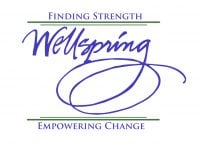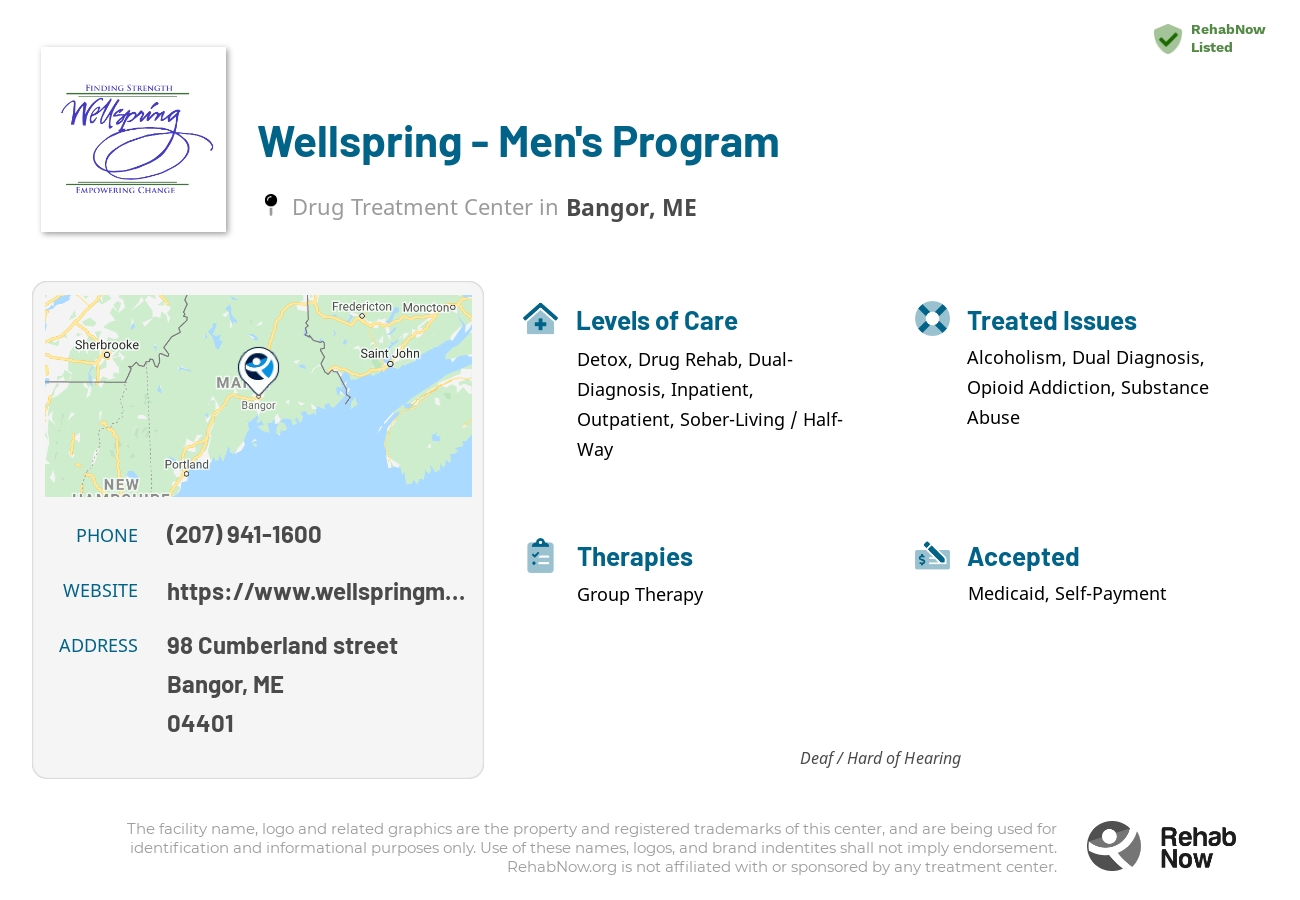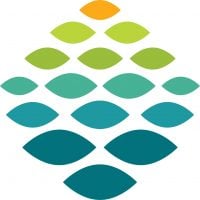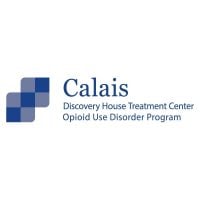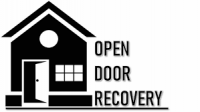About Wellspring - Men's Program in Maine
Wellspring - Men's Program is a drug treatment facility located in Bangor, ME. Specifically designed to cater to men suffering from alcoholism, dual diagnosis, opioid addiction, substance abuse, and drug addiction, Wellspring offers a range of services to help individuals on their path to recovery. With various levels of care available, including detox, inpatient, outpatient, and residential programs, individuals can receive the necessary support and treatment based on their unique needs. Wellspring - Men's Program is affiliated with Wellspring, a reputable organization dedicated to helping individuals overcome addiction and achieve long-term sobriety.
Wellspring - Men's Program in Bangor, ME, provides a comprehensive range of services to address alcoholism, dual diagnosis, opioid addiction, substance abuse, and drug addiction. Through their various treatment methods, individuals can receive the support they need to overcome their addiction. The facility offers detoxification services to help individuals safely manage withdrawal symptoms. In addition, their inpatient program provides a structured and supportive environment for individuals to work towards recovery. Outpatient services are also available, allowing individuals to receive treatment while maintaining their daily responsibilities. Furthermore, Wellspring - Men's Program offers sober-living/half-way houses as a transitional step towards independent living after completing their programs.
Genders
Ages
Modality
Additional
Conditions and Issues Treated
A combination of treatments is often needed to treat drug abuse. Some addictions can be treated with counseling and support groups. In other cases, drug abuse can lead to a medical problem and require medical treatment. Treatment for drug addiction typically combines counseling and psychotherapy with medication and behavioral therapies.
A combination of treatments is often needed to treat drug abuse issues effectively. In the case of drug abuse, there is no easy answer or one-size-fits-all cure.
Opioid addiction has become a significant health problem in the United States. In 2015, there were 91 opioid overdose-related deaths per day, with a substantial increase in mortality rate in 2014.
When opioid addiction has reached a point where a person’s life becomes unmanageable, treatment options are available to help them get sober. Treatment that includes medical care with medications and counseling can help a user transition into sobriety.
When someone in struggles with both addiction and mental or emotional illness, this is considered a dual diagnosis. Dual diagnosis treatment can include therapy for these issues to happen simultaneously, which will allow either of them to be treated effectively.
Sometimes people who have suffered from addiction disorder also suffer from co-occurring disorders such as depression, anxiety, bipolar disorder, etc., making them “dual diagnoses.” Dual diagnoses require specialized treatment programs where drug and alcohol addiction are addressed along with psychiatric illnesses. Some rehabilitation facilities provide patients suffering from cooccurrences a program with highly integrated services and a clean environment with few distractions to help them succeed.
Levels of Care Offered
This center offers a variety of custom treatment tailored to individual recovery. Currently available are Detox, Drug Rehab, Dual-Diagnosis, Inpatient, Outpatient, Residential, Sober-Living / Half-Way, with additional therapies available as listed below.
One of the first things an addict should do when entering treatment is to abstain from using illicit drugs completely. Depending on the length of time that the person has been using, the addict may have to go through alcohol or drug withdrawal. Fortunately, detox doesn’t have to be done alone, and withdrawal symptoms can be managed medically in an inpatient or outpatient setting. While detox may be uncomfortable, it is not life-threatening. Detoxification allows the addict to rid the body of all traces of drugs or alcohol and gives the addict a clean slate for their recovery.
Inpatient treatment for alcoholism or drug addiction is an option that provides the addict with a supportive environment in which they can stop using. After detox, an inpatient treatment center provides a structured environment for the addict to recover from their addiction and begin taking steps toward a lifetime of sobriety.
This type of treatment is appropriate for addicts that are most in need of intensive care and supervision. This includes those who were unable to quit on their own, those who need more structure than they can get in outpatient treatment, and those whose addiction has led them into legal trouble or severe health problems.
Outpatient treatment is often used for drug addicts in drug rehab. Outpatient treatment consists of counseling and therapy sessions. This form of treatment is also called ‘day-treatment’. The outpatient treatment process begins with the addict’s initial detox period, lasting about ten days.
Outpatient treatment is used for those who are at moderate risk for ‘slipping back’ into the addiction, for those who:
- Are not currently experiencing any side effects from withdrawal and can handle social pressure
- Can handle stressors that might trigger relapse
- Have a stable living environment or have moved out of their previous environment, which was not conducive to being sober
- Have a support system that allows them to go to a facility a few times a week while still keeping their current responsibilities
- Have no legal obligations, being either on parole or probation, that require them to seek treatment at a mandatory facility
- Are not currently experiencing any side effects from withdrawal and can handle social pressure
- Have a stable living environment or have moved out of their previous environment, which was not conducive to being sober
Sober living homes, also known as halfway houses, provide recovering people with a structured drug-free environment to live in that bridges inpatient rehab and the much less structured world of outpatient rehab. Sober living homes offer a person early in recovery the opportunity to practice recovery skills in a safe environment.
The atmosphere in sober living homes is less restrictive than in an inpatient facility. Members have to follow many rules, including not drinking and using drugs and paying rent and bills. There is no limit to the period of stay. As long as you stay, you should follow the rules because it’s the opportunity for individual and group sobriety.
Residential treatment programs are those that offer housing and meals in addition to substance abuse treatment. Rehab facilities that offer residential treatment allow patients to focus solely on recovery, in an environment totally separate from their lives. Some rehab centers specialize in short-term residential treatment (a few days to a week or two), while others solely provide treatment on a long-term basis (several weeks to months). Some offer both, and tailor treatment to the patient’s individual requirements.
Therapies & Programs
Group therapy can help build a stronger support system and give addicts in Bangor, ME insight into their addiction that they gain through shared conversations. Group therapy occurs in a controlled group environment, exclusive of one on one meetings. This makes it safer for patients to feel comfortable sharing the struggles they’re going through and gaining perspective.
Payment Options Accepted
For specific insurance or payment methods please contact us.
Wellspring Associated Centers
Discover treatment facilities under the same provider.
- Wellspring - Men's Residential House in Bangor, ME
- Wellspring - Women's Residential House in Bangor, ME
- Wellspring in Bangor, ME
- Wellspring - Outpatient & Adminiistrative Services in Bangor, ME
- Wellspring - Women's Program in Bangor, ME
Learn More About Wellspring Centers
Additional Details
Specifics, location, and helpful extra information.
Bangor, Maine 4401 Phone Number(207) 941-1600 Meta DetailsUpdated November 25, 2023
Staff Verified
Wellspring - Men's Program Patient Reviews
There are no reviews yet. Be the first one to write one.
Bangor, Maine Addiction Information
Prescription opioid abuse is the most common form of substance abuse in Maine. More than 10% of these residents have also admitted to using prescription drugs for non-medical purposes. Between 2013 and 2014, 4 out of every 5 deaths in Maine were caused by illicit drugs. One in five high school students in Maine uses marijuana every single month.
Bangor, ME, has a moderate drug addiction problem, according to the most recent National Survey on Drug Use and Health (NSDUH). In 2018, there were 354 drug fatalities in Maine, compared with 417 in 2017. There are twice as many drug-related emergency room visits in Bangor, ME as the national average. Inpatient rehab in Bangor includes a variety of programs such as extended care and transitional housing.
Treatment in Nearby Cities
- Blue Hill, ME (28.7 mi.)
- Rockland, ME (51.5 mi.)
- Lubec, ME (87.7 mi.)
- Freeport, ME (93.1 mi.)
- Auburn, ME (87.3 mi.)
Centers near Wellspring - Men's Program
The facility name, logo and brand are the property and registered trademarks of Wellspring - Men's Program, and are being used for identification and informational purposes only. Use of these names, logos and brands shall not imply endorsement. RehabNow.org is not affiliated with or sponsored by Wellspring - Men's Program.
